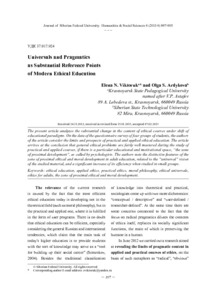Универсалии и прагматика как содержательные ориентиры современного этического образования
Скачать файл:
URI (для ссылок/цитирований):
https://elib.sfu-kras.ru/handle/2311/9841Автор:
Viktoruk, Elena N.
Викторук, Е.Н.
Ardykova, Olga S.
Ардюкова, О.С.
Дата:
2013-06Аннотация:
The present article analyzes the substantial change in the content of ethical courses under shift of educational paradigms. On the data of the questionnaire survey of four groups of students, the authors of the article consider the limits and prospects of practical and applied ethical education. The article arrives at the conclusion that general ethical problems are fairly well mastered during the study of practical and applied courses, if there is a particular educational and motivational space, “the zone of proximal development”, as called by psychologists. The authors note the distinctive features of the zone of proximal ethical and moral development in adult education, related to the “universal” vision of the studied material, and a significant increase of its efficiency when studied in small groups. В статье проанализировано существенное изменение содержания этических курсов в условиях смены образовательных парадигм. Опираясь на данные, полученные в ходе анкетных опросов четырех различных групп учащихся, авторы рассматривают пределы и перспективы практико-прикладного этического обучения. Делается вывод о том, что общие этические проблемы достаточно хорошо осваиваются в ходе изучения практико-прикладных курсов, если возникает особая учебно-мотивационное пространство, называемое психологами «зона ближайшего развития». Авторы отмечают особенности зоны ближайшего этико-морального развития в обучении взрослых, которые связаны с «универсальным» видением изучаемого материала и значительным повышением эффективности его освоения в микрогруппах.
Коллекции:
Метаданные:
Показать полную информациюСвязанные материалы
Показаны похожие ресурсы по названию, автору или тематике.
-
ЭТИКА И ДЕОНТОЛОГИЯ ТВОРЧЕСТВА : доклад, тезисы доклада
Качай Илья Сергеевич (Анапа, 2025)В статье затрагиваются этические основания творчества. Аргументируется, что этический аспект творчества иллюстрирует специфические особенности направленности творчества. Проводится разграничение творчества и псевдотворчества ... -
Ethical Education Innovations: Ethic-Project Work in the Sphere of Commercial Business-Education
Viktoruk, Elena N.; Chebotarev, Efim V.; Е.Н. Викторук; Е.В.Чеботарев (Сибирский федеральный университет. Siberian Federal University, 2009-03)In the given article we consider the conditions and perspectives of development of ethical types of «know-how» (and first of all, ethic-project works), basing on the many years’ working experience of LLC SDH, the «Training ... -
Ценности инновационной деятельности для студентов, экспертов и предпринимателей Красноярска: желаемый идеал, надежды и реальность
Москвич, Ю.Н.; Moskvich, Yury N.; Викторук, Е.Н.; Viktoruk, Elena N. (Сибирский федеральный университет. Siberian Federal University., 2011-11)The end of the 20th century has changed the world pattern dramatically. A new division of labor has appeared as well as the need for innovative growth of many branches of economy has intensified. All these changes have ... -
Two Worlds, Two Languages, Two Semantics, Two Linguistic Principles of Compositionality, and Two Kinds of Nonsenses (Criticizing Wittgenstein’s philosophy of morals and of metaphysics by means of discrete mathematical modeling a formal-ethical aspect of his worldview)
Lobovikov, Vladimir O.; Лобовиков, В.О. (Сибирский федеральный университет. Siberian Federal University., 2015-05)The paper represents a systematical critique of Wittgenstein’s attitude to semantics of the natural language of ethics and metaphysics. The critique is implemented by means of a discrete mathematical simulation of the ... -
Axiology and Agathology
Shokhin, Vladimir K.; Шохин, В.К. (Сибирский федеральный университет. Siberian Federal University, 2020-08)From the very beginning, attention is given to the fact that, being introduced at the very beginning of the 20th century, the axiology term, meaning the doctrine of values, almost immediately led to a boom in the development ...

